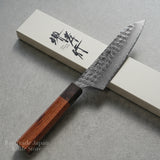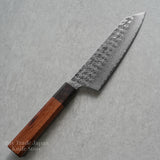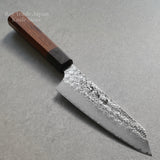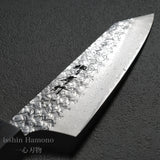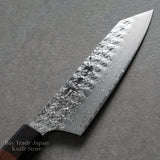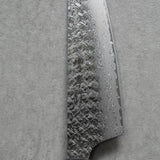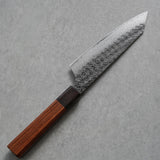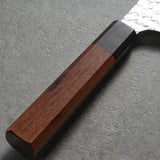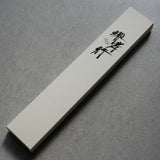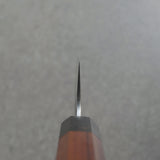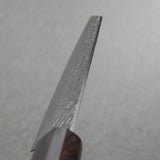Sakai Takayuki SPG2 Hammered Damascus Wa Kengata Santoku Knife 160mm Rosewood
Brand: Sakai Takayuki
Type: Wa Kengata Santoku (Double edged)
Blade Material: Hammered(TSUCHIME) Damascus Stainless Steel
Core: Super Gold 2 (SPG2/SG2)
Blade Length: 160mm (6.3'')
Blade Width: 45mm (1.7")
Blade Thickness: 2mm
Overall Length: 310mm (12.2")
Weight: 160g (5.6oz)
Handle: Rosewood with Black Pakkawood Ferrule
HRC: 63-4
Made in Japan
This hammer-mark pattern evokes a sense of Japanese tradition. Moreover, the intricate and wave-like beauty of the Damascus pattern adds to its allure.
HAMAGURI-BA "HAMAGURI-BA" is the Japanese term for this edge, derived from "HAMAGURI" (clam) and "BA" (edge). This distinctive edge shape facilitates effortless release of ingredients, ensures smooth cutting, and enhances the overall strength and durability of the blade.
About "Super Gold 2" Super Gold 2 (SPG2/SG2) is registered trademark of Takefu Special Steel Co Ltd. A large quantity of high alloy ingredients are included by powder metallurgy. And it is super high quality steel that rich in high corrosion-resistant, high hardness, high toughness, high wear resistance. Though this HRC is high, it is easy to relatively re-sharpen it. And The edge retention is outstanding. Thus famous Japanese Chefs also prefer this steel.
Take a look at our Ceramic Sharpening Stone.
NOTE:
The core steel is SPG2, and the side steel is rust-resistant; however, please be sure to wash, wipe, and dry the knife thoroughly after each use. If rust appears on the blade, use a cleanser or take it to a sharpening service (note that scratches may occur).
Avoid twisting the edge or striking the blade. Do not cut frozen foods or bones, as the thinner, sharper edge of Japanese knives may chip or break. Since Japanese knives are handcrafted, slight scratches may appear naturally.












